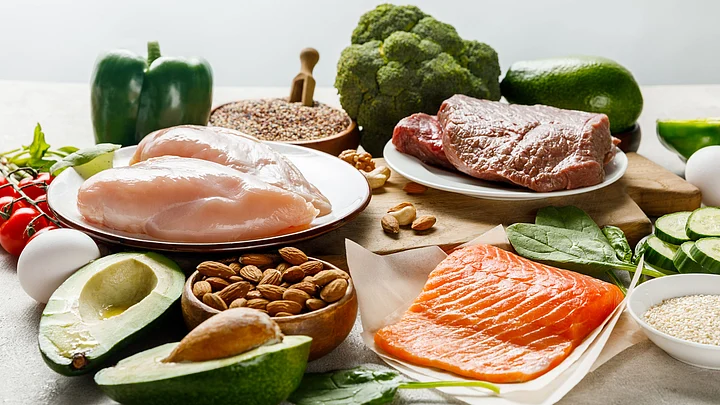Enough has been said and written about the importance of eating enough protein.
It is a macronutrient that is omnipresent — it lives in every cell in your body, every organ and system — and that is a clear indication of just how important it is to eat enough of it on daily basis.
We need it everyday because unlike fats and carbohydrates it is not stored in the body.
Protein is essential for everyone, not just those who frequently hit the weight racks at the gym. Yet most of us don’t get enough of it.
So what can this lead to? Lack of protein in your diet can lead to wide-ranging side effects. Below is a check list of the side effects and the red flags to look out for.
Recommended Dietary Allowance (RDA) For Proteins
How much protein do you need? The answer is not so simple, because it is different for different people.
Protein needs vary according to age, gender, health history, and how much exercise you do.
But on an average, the RDA for a healthy adult with minimal physical activity is 0.8 to 1 grams of protein per kilogram of bodyweight every day. It increases in specific circumstances.
Your Balance Is Sketchy
Protein is needed to build muscle, so its deficiency can lead to depletion of muscle mass, which in turn can have huge repercussions like reduced strength, difficulties in maintaining balance and muscle aches.
You Are Always Tired
Loss in muscle mass could directly lead to chronic fatigue. When the deficiency is chronic the body breaks down the muscle to supply sufficient protein, leading to loss of energy and strength.
Plus protein deficiency could also lead to anaemia (as haemoglobin too needs protein for its formation), because of which as enough oxygen does not reach the cells, fatigue becomes a serious problem.
In fact, fatigue is one of the earliest signs of protein deficiency.
You Are Gaining Weight
Low muscle mass equals slower metabolism too, and that could directly lead to weight gain as the rate at which the body burns calories slows down.
Plus protein not just fuels us, it gives us higher satiety (keeps us full for longer) too, by decreasing the level of hunger hormone ghrelin, so can be a great help to keep cravings low and thus the weight in check.
Protein also takes longer to get digested in the gut. So if your meal is low protein than it will get digested quickly and will cause your blood sugar to rise.
This rise will be followed by a drop soon enough and this constant spiking and dropping leads to massive craving for food, particularly for sugar.
You Are Bloated
Albumin is a protein that circulates in the blood and is important to prevent fluid from building up in your tissues (commonly called swelling or oedema), especially in the abdomen, legs, feet, and hands.
Basically the proteins help to hold salt and water inside the blood vessels so fluid does not leak out into the tissues.
When the level of protein in the blood is low, water may leave the blood vessels and collect in the tissues.
Your Memory Is Poor
Our brain uses neurotransmitters to transfer information between cells. These are made of amino acids, which are the building blocks of protein.
That is why not enough protein in the diet could lead to insufficient production of neurotransmitters, and undermine the efficiency and working of the brain leading to memory loss, cognitive issues, looming brain fog, concentration problems and more.
Your Mood Stays Low
Without enough protein, our brain might not be able to produce enough of the neurotransmitters needed to regulate our mood. For example, with low levels of dopamine and serotonin you may feel depressed or overly aggressive.
You Have Poor Skin, Hair and Nails
Elastin, collagen, and keratin... do they sound familiar? These are all proteins which act as a building block for healthy hair, skin, and nails.
So when our body cannot make enough of them (due to lack of enough amino acids), this could show up as brittle or thinning hair, dry and flaky skin, and deep ridges on the fingernails.
You Fall Sick Too Often
Not many people get the connect of protein with strengthened immunity and this is one oversight that can mess up the immunity of so many of us.
Protein deficiency can affect antibody production negatively.
One amino acid called cysteine is particularly important as it is involved in the formation of an antioxidant glutathione in the body, which is a potent immunity booster.
Your Wounds Heal Slowly
Protein is needed to make collagen which is found in connective tissues as well as the skin.
Plus we need it to help the blood clot. That is why a severe deficiency could slow down healing substantially after an injury.
Also remember that proteins make up our bones too. So, it’s not surprising that protein deficiency is linked to more risk for bone fractures too.
How To Prevent Protein Deficiency
Don’t take protein lightly. The good news is that protein deficiency can be reversed by eating a sufficient amount of protein-rich foods so focus on that.
Some high protein pantry musts are dairy, Nuts and nut butters and seeds, eggs, poultry and sea food, legumes, quinoa and buckwheat.
(Kavita is a nutritionist, weight management consultant and health writer based in Delhi. She is the author of Don’t Diet! 50 Habits of Thin People (Jaico), Ultimate Grandmother Hacks: 50 Kickass Traditional Habits for a Fitter You (Rupa) and Fix it with foods.)
(At The Quint, we question everything. Play an active role in shaping our journalism by becoming a member today.)
